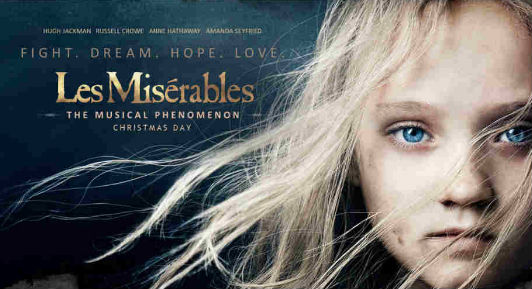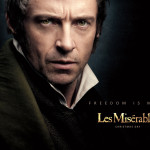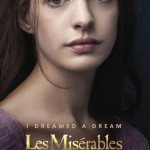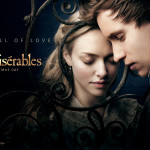Les Misérables is truly a marmite of a musical, adapted of course from Victor Hugo‘s classic novel based around characters living in the period from 1815 to the 1832 June rebellion in Paris. Why marmite? Simply that it divides opinion sharply.
Initially it suffered bad critical reviews but succeeded by word of mouth, that zenith of the art of stage production, a cult that made a global hit. Indeed, some friends have seen it on stage dozens of times in its 20 years in London and elsewhere, wept buckets each time, and are now preparing for multiple viewings of the movie, tissues at the ready. Others seem generally unmoved.
Personally, I saw it on stage at the Palace Theatre in Manchester sometime in the early-to-mid 90s. I remember people hanging from the barricade that dominated the stage, but I never felt Lez Miz, the musical, to be in the same class as, say, West Side Story, Cabaret or My Fair Lady, to name but three – maybe because it styles itself as a modern opera without the depth or quality to deliver on that promise.
Most worryingly, I could not recall any of the songs thereafter (as the likes of Maria, Tonight, America, Cabaret, Mein Lieber Herr, On The Street Where You Live, Wouldn’t It Be Lovely and many more stuck instantly in my brain) It wasn’t to my recollection a barnstorming evening but it was moderately entertaining. People often ask me “but surely you remember…” but honestly I can’t remember any melody. Not a single one!
Watching the movie early in 2013 was therefore an interesting revisionist exercise to see whether my opinions had changed, notably about the songs, and indeed whether the translation to big screen improved the overall effect.
The cast assembled was mostly actors rather than singers, singing in situ on set and without any vocal training, so I gather – a slightly curious choice, you might think, though these are deeply fashionable people: Hugh Jackman, Russell Crowe (together an Antipodean connection), Oscar-winning Anne Hathaway, Amanda Seyfried, Helena Bonham Carter and Sacha Baron Cohen (as the comically awful innkeeper and his wife who get to sing the only real comic song, Master of the House), among others – though the distinctive poster image of the young Cosette is child actress Isabelle Allen. How would they fare in French historical drama with singing?
That said, according to Wikipedia Jackman prepared thoroughly:
To prepare for the role, Jackman lost 15 pounds and later regained 30 pounds to mirror his character’s success. He avoided drinking coffee, warmed up at least 15 minutes every day, kept Ricola lozenges, drank as much as seven litres of water per day, sat in steam three times a day, took cold baths and used a wet washcloth over his face while flying. He also cited the musical’s original co-director Trevor Nunn for his training.
In the unlikely event I’m ever required to appear in a Hollywood blockbuster musical, I shall show at least the same dedication!
First thing to note about the movie is the breathtaking production design and cinematography. This is 19th Century Paris recreated on a colourfully epic scale, between exteriors and astonishingly detailed sets – even the vast and ailing warship and huge elephants look amazing. The camera glides up beyond the rooftops, then swoops down into candle-lit interiors, down into basements and into the sewers. Visually, this is a treat for the eyes and quite the most spectacular achievement. It is the scale and sweeping vision, matched by a minute attention to detail that makes LM the movie stand out beyond the stage show, for which credit is due to director Tom Hooper.
Where it is weakest is in the treatment of Hugo’s drama, a thing of shade and light, which Hooper has chosen to paint with a heavy coat of melodrama rather than underplaying for greater effect. There is way too much emoting going on, which sadly detracts from the emotional impact rather than enhancing it. No doubt there are many in floods of tears, but speaking as one who is not unknown to shed the odd tear in a movie I felt no inclination so to do in this case – I found the movie unengaging but tending towards the manipulative.
Indeed, the moment where the pathos is at its most powerful involves no music and no blubbering whatever, as Javert pins his own medal for courage in the line of duty on the chest of the dead Gavroche. Had Hooper toned down the tears and the tantrums the impact would, perversely, have been greater. Silence can make the greatest impact of all, though there is precious little of it in this production.
On the whole, the cast do a pretty solid, workmanlike job. I say this judiciously, given my mixed opinion of Russell Crowe. He has two modes of operation: either as a fine and subtle actor, or a dreadful ham employing a feast of eye-swivelling and Machiavellian grimaces. Thankfully, he is quite restrained here to good effect, though comfortable he is not. Nor, maybe, does he possess the best of voices – though neither is it a total disgrace. It would have been perhaps kinder to cast someone who felt more at home in the genre than simply to employ an A-lister.
Much the same can be said for Mr. Jackman, who reaches the top notes without splattering any on the ceiling, but neither does he convince you he is set for a secondary career as an operatic tenor. In fact, none of the leading players disgrace themselves with singing, with Ms Hathaway possibly coming out on top along with Samantha Barks as a feisty Eponine, arguably more deserving of the love of Marius than a somewhat coy and ineffectual Cosette (Amanda Seyfried).
Eddie Redmayne‘s Marius is arguably the greatest of the vocal hits (as well as being my daughter’s heartthrob), but suffers what I shall call Hooper Syndrome – far too much facial contortion. To him I would say take a lesson from the masters of the art – with screen acting, less is always more (see my review of Quartet for a case in point.)
It is certainly not the fault of the cast that too much of the music is mundane and fades into the background. At times it is a distraction from the words, which, while often sung clearly can sometimes barely be heard beneath the orchestral background (presumably hiding somewhere behind the barricades.) Even given its operatic ambitions, there were many times when I wished the dialogue had been spoken, not sung.
This might also have prevented songs from running into one another, and indeed to prevent the threads of storyline from becoming submerged as Valjean and Javert’s story of rivalry and redemption become entwined with the love story between Marius and Cosette against the backdrop of the June rebellion. The political element is slightly naive and perfunctory, but then so it was in Evita, amongst others. More time should be devoted to the narrative and less to fancy flourishes.
But clearly Les Mis hits its audience and pleases very many. For that you can’t blame it. It is what it is – you will like the music or you will not, though for myself the initial experience has been repeated: barely over an hour since the show I still can’t remember a single melody. For me personally that is not the mark of a successful musical, however much people tell me the virtues of Stars, Suddenly, I Dreamed a Dream, At the End of the Day and other numbers.








Seen it last week. Tedious.i